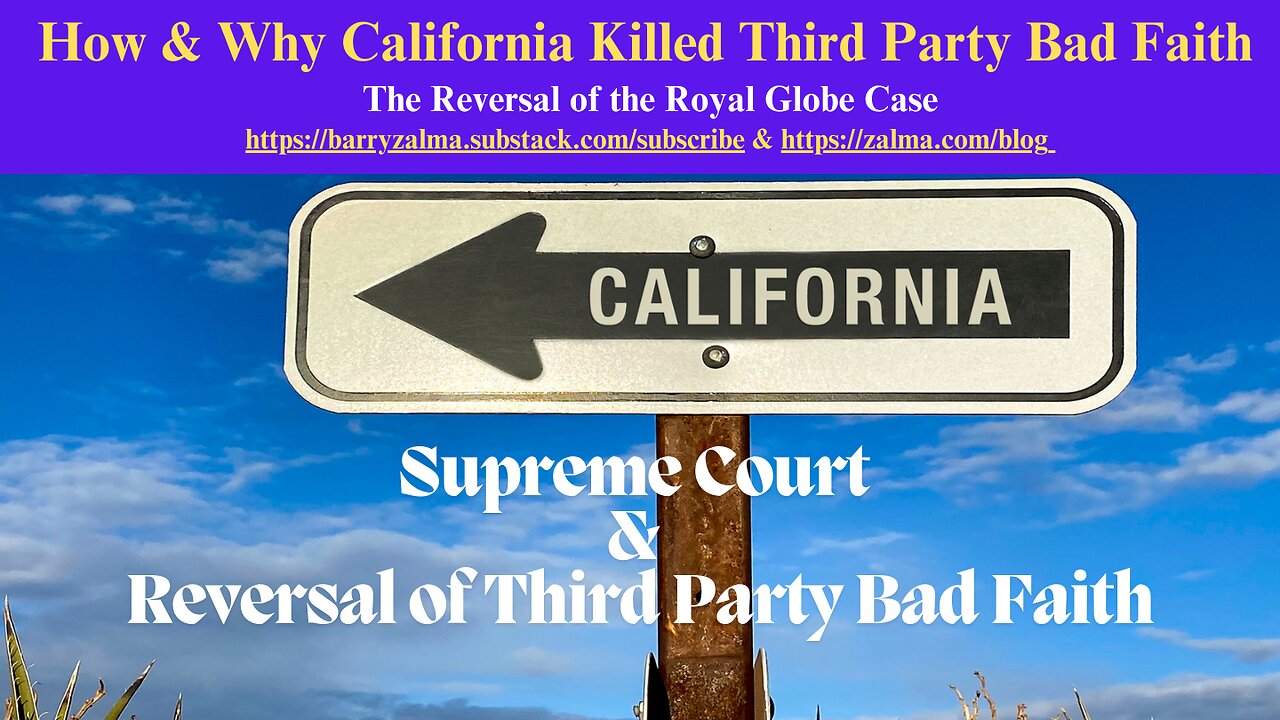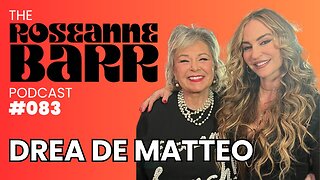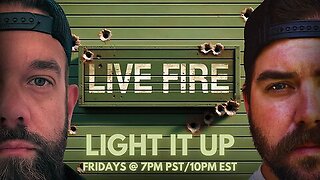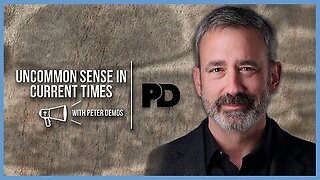Premium Only Content

How & Why California Killed Third Party Bad Faith
The Reversal of the Royal Globe Case
Post 4958
In 1979, the California Supreme Court, in Royal Globe Ins. Co. v. Superior Court (1979) 23 Cal.3d 880, 153 Cal.Rptr. 842, 592 P.2d 329 allowed an individual injured through the negligence of an insured to sue the insured's insurer for unfair claims practices pursuant to California Insurance Code section 790.03, subdivision (h)(5), the Fair Claims Settlement Practices AcT. The Supreme Court established a private cause of action to anyone who believed the statute was violated:
"If, as we conclude, the act affords a private party, including a third party claimant, a right to sue an insurer for violating subdivision (h), it is inconceivable that the Legislature intended that such a litigant would be required to show that the insurer committed the acts prohibited by that provision ‘with such frequency as to indicate a general business practice.’ There would be no rational reason why an insured or a third party claimant injured by an insurer's unfair conduct, knowingly performed, should be required to demonstrate that the insurer had frequently been guilty of the same type of misconduct involving other victims in the past. ... Although the language of the statute is not clear, if the premise is accepted that a private party may bring an action for an insurer's violation of subdivision (h) under the rationale of [precedent omitted], then a single violation knowingly committed is a sufficient basis for such an action."
The court also concluded the third-party suit may not be brought until the action between the injured party and the insured is concluded. As a result of the Royal Globe decision insurers who insured people for their negligence found they were defending two lawsuits: first, the action against the insured; and second, a suit for bad faith claims handling by the injured party.
Plaintiffs’ lawyers were ebullient. They had two swipes at the insurer. If they succeeded in the tort case without a settlement then they were able to sue the insurer for bad faith. Rather than defending an insured the insurer was placed in the unenviable position of defending the insured and ignoring its individual exposure to bad faith tort and punitive damages.
Rather than being part of multiple suits insurers found it best to settle bodily injury and property damage suits for more than they were worth to avoid having to defend the second suit with the potential for tort and punitive damage judgments. Justice was not served. In my opinion, justice for the insurer and those insured was destroyed.
After Royal Globe every bodily injury or property damage lawsuit where there was a claim that the insurer refused to try in good faith to make a prompt, fair, and equitable settlement of the personal injury claim was a violated Insurance Code, section 790.03, subdivision (h)(5). The plaintiff would then sue the defendant’s insurer seeking tort and punitive damages. As a result, the Supreme Court allowed a person not a party to the contract of insurance to sue an insurer for the failure of the insurer to treat the stranger – the claimant/Plaintiff – suing its insured with good faith and fair dealing.
The cases that dealt with the covenant of good faith and fair dealing were mostly cases involving the insurer's duty to accept reasonable settlement or duty not to unreasonably withhold payments due under the policy.
The case load in California trial courts almost immediately doubled. Courts were overwhelmed. Many simple cases took as much as five years to go to trial. Civil cases were so numerous that they were taken off the schedule because of the need to try criminal cases. Mandatory settlement conferences were ordered in every case and judges pressured the parties to settle so they could clear their calendars to try criminal cases and those that had waited five years for a trial.
In Royal Globe, a bare majority of the California Supreme Court held that under section 790.03, subdivisions (h)(5) and (14), a private litigant could bring an action to impose civil liability on an insurer for engaging in unfair claims settlement practices. The court ruled that subdivisions (h)(5) and (14) imposed on the insurer a duty owed directly to the third party claimant, separate from the duty owed to the insured. To support its holding, the court relied primarily on section 790.09, which provides that cease and desist orders issued by the Insurance Commissioner under the Unfair Practices Act shall not "relieve or absolve" an insurer from any "civil liability or criminal penalty under the laws of this State arising out of the methods, acts or practices found unfair or deceptive."
In addition, the Royal Globe court interpreted the foregoing provisions as conferring on the injured claimant a cause of action arising from a single instance of unfair conduct, so that a plaintiff did not have to prove that the insurer committed the acts prohibited by the statute as a general business practice. Despite the fact that section 790.03, subdivision (h), proscribes "[k]nowingly committing or performing with such frequency as to indicate a general business practice" the various specified unfair claims-settlement practices, the Royal Globe majority held that "a single violation knowingly committed is a sufficient basis for such an action."
In Moradi-Shalal v. Fireman's Fund Ins. Companies, 250 Cal.Rptr. 116, 46 Cal.3d 287, 758 P.2d 58 (Cal. 1988) the California Supreme Court reversed the Royal Globe decision. In reaching its decision, the Supreme Court noted:
"Confirming Justice Richardson's prediction in his Royal Globe dissent, several commentators have observed that the rule in that case promotes multiple litigation, because its holding contemplates, indeed encourages, two lawsuits by the injured claimant: an initial suit against the insured, followed by a second suit against the insurer for bad faith refusal to settle.
* * *
"Thus, one author observed, 'One result of this decision is that every time a demand is now made to settle a lawsuit, an additional demand is likely to be forthcoming to coerce higher settlements. The demand now carries the threat that, unless settlement is immediate, a separate suit will be filed for violation of the Unfair Practices Act. The public ultimately will be affected by the additional drain on judicial resources. Moreover, the public will indeed suffer from escalating costs of insurance coverage, a certain result of inflated settlements and costly litigation.'"
After the decision became final in 1988, no private action may be brought under section 790.03, subdivision (h), unless a final judicial determination of the insured's liability has been first obtained and Royal Globe was overruled. [Moradi-Shalal v. Fireman's Fund Ins. Companies, 250 Cal.Rptr. 116, 46 Cal.3d 287, 758 P.2d 58 (Cal. 1988)] Since the decision in Moradi-Shalal an insurer acting in bad faith must be, and may only be, disciplined by the California Department of Insurance which eventually created the California Fair Claims Settlement Practices Regulations in 1993.
Article adapted from my book It’s Time to Abolish the Tort of Bad Faith Available as a paperback here. Available as a Kindle book here.
ZALMA OPINION
Moradi-Shalal stopped one abuse of the so-called tort of bad faith, third party bad faith. It left alone first party bad faith although the argument that the statute provides a administrative remedy for bad faith claims handling and the effect of the California Fair Claims Settlement Practices Regulations in 1993. The Supreme Court did not apply the same reasoning to first party bad faith because the appeal only dealt with third party bad faith. The arguments used in Moradi-Shalal, apply equally in first party bad faith cases.
(c) 2024 Barry Zalma & ClaimSchool, Inc.
Please tell your friends and colleagues about this blog and the videos and let them subscribe to the blog and the videos.
Subscribe to my substack at https://barryzalma.substack.com/subscribe
Go to X @bzalma; Go to Newsbreak.com https://www.newsbreak.com/@c/1653419?s=01; Go to Barry Zalma videos at Rumble.com at https://rumble.com/account/content?type=all; Go to Barry Zalma on YouTube- https://www.youtube.com/channel/UCysiZklEtxZsSF9DfC0Expg
Go to the Insurance Claims Library – https://lnkd.in/gwEYk
-
 4:20:21
4:20:21
Nerdrotic
15 hours ago $68.22 earnedDaradevil Born Again, Comics Industry CRASH, Neu-Hollywood REBUILD | Friday Night Tights #337
215K45 -
 1:32:34
1:32:34
Glenn Greenwald
11 hours agoThe Future of Gaza With Abubaker Abed; Journalist Sam Husseini On His Physical Expulsion From Blinken’s Briefing & Biden’s Gaza Legacy | System Update #391
108K84 -
 1:34:48
1:34:48
Roseanne Barr
14 hours ago $21.14 earnedWe are so F*cking Punk Rock! with Drea de Matteo | The Roseanne Barr Podcast #83
84.7K58 -
 1:08:20
1:08:20
Man in America
15 hours ago🇨🇳 RedNote: A CCP Trojan Horse Deceiving Americans? w/ Levi Browde
41.4K38 -
 3:55:11
3:55:11
I_Came_With_Fire_Podcast
18 hours agoTrump SABOTAGE, LA FIRE CHIEF SUED, and BIDEN’S LAST F-U!
27.1K8 -
 2:59:47
2:59:47
Joker Effect
9 hours agoUkraine in a video game? Hardest thing I have done. S.T.A.L.K.E.R.2 Heart of Chornobyl,
97.1K7 -
 1:15:22
1:15:22
Flyover Conservatives
1 day agoEczema, Brain Fog, B.O., and Gas… Eating Steak and Butter Creates Ultimate Health Hack - Bella, Steak and Butter Gal | FOC Show
72.3K6 -
 51:58
51:58
PMG
13 hours ago $2.92 earned"Can the Government Learn from Elon Musk’s 70% Labor Cut? A Deep Dive into Inefficient Agencies"
51.4K1 -
 6:39:15
6:39:15
Amish Zaku
12 hours agoRumble Spartans #10 - New Year New Maps
44.1K3 -
 1:04:58
1:04:58
In The Litter Box w/ Jewels & Catturd
1 day agoNo Tax On Tips! | In the Litter Box w/ Jewels & Catturd – Ep. 722 – 1/17/2025
160K32